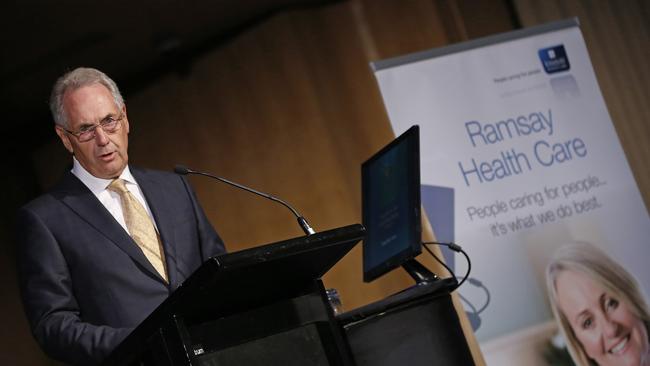
It is not a broken business and the group’s stable management is its most-prized asset and why under potential KKR ownership it may grow rather than shrink.
Ramsay chairman Michael Siddle joined the company in 1968 and became a founding director in 1975. Chief executive Craig McNally has served 34 years, working across all parts of the business, while Carmel Monaghan, its Australian hospitals boss, has held various roles at the group since 1998.
This steady hand has seen Ramsay grow to become Australia’s biggest private operator, with extensive operations in the UK, Europe and Asia and created what is known as the “Ramsay platform”, which is attractive to KKR.
And while KKR is known as one of Wall Street’s most notorious corporate raiders, it is no stranger to health care and knows what makes hospitals successful.
In 2006, its completed the biggest leveraged buyout in history when it acquired America’s biggest private hospital operator, HCA Healthcare, for $US33bn ($44.92bn) with Bain Capital and Merrill Lynch.
In 2011, HCA became a public company again. Its shares have since surged to nearly $US270 from its $US30 listing price.
While Ramsay’s share price has tracked largely sideways for the past five years, the company – and its relatively stable leadership – has still delivered stellar growth, soaring from $1.60 to $83.80 in the past 20 years.
This is unlike smaller rival Healthscope – Australia’s second biggest operator – which has twice been taken over by private equity, with Brookfield tasked with somewhat rebuilding the business when it acquired it for $4.4bn in June 2019.
At Ramsay, it does not bear the scars of being flipped and flogged and therefore, is in no need of ‘fit guys with laptops and spreadsheets’ rushing into its corporate office to rebuild it.
KKR has also assembled a consortium of what it says is “reputable, well-capitalised Australian and international long-term investors”, which include the nurses superannuation fund HESTA, chaired by former Labor health minister Nicola Roxon.
KKR knows how to play the politics that make hospitals tick and to the uninitiated can seem like herding cats, considering all key stakeholders – health funds, doctors and nurses groups – often are at loggerheads.
That’s not to say Ramsay will be left untouched.
What a takeover means for the group is an acceleration of strategies that have been bogged down, such as digitisation, or been shelved like a sale and leaseback of its hospitals, which some analysts say could reap up to $8.5bn.
While private equity has a reputation for ruthless cost-cutting, the better firms do not do so indiscriminately.
They realise investing in their portfolio business can also deliver better returns if done so in areas that are conducive to higher profits.
For private hospitals, this means delivering a better quality and standard of care than you would otherwise get for free in the public sector.
After all, nobody would choose to pay up to $10,000 out-of-pocket to have their baby delivered in a private hospital if private equity cost-cutting affected patient experience or worse, adverse clinical outcomes.
Nor would they fork out about $5000 out-of-pocket for a knee replacement on top of their insurance excess and ever-rising premiums, most likely preferring to wait and have it done for free at a public hospital.
And this is why the NSW Nurses and Midwives Association took comfort from HESTA chief executive Debby Blakey, who said the Ramsay takeover “represents an exciting opportunity to invest in the future growth and success of Australia’s leading private hospital provider”.




Ramsay Health Care has one thing that separates it from smaller rivals that have found themselves taken over by private equity: stability.